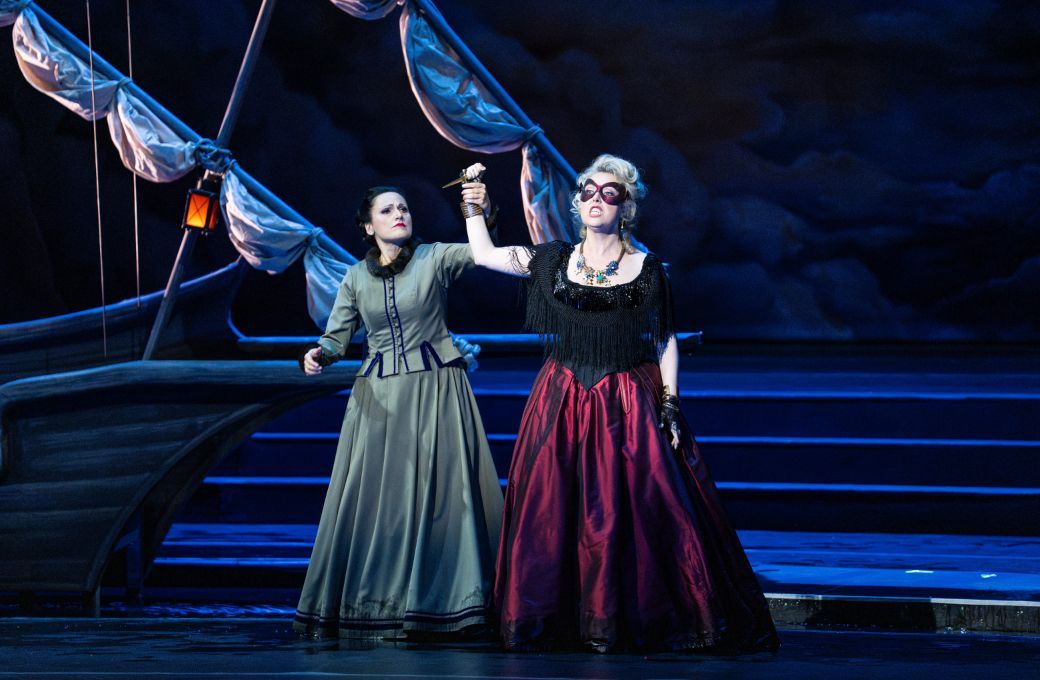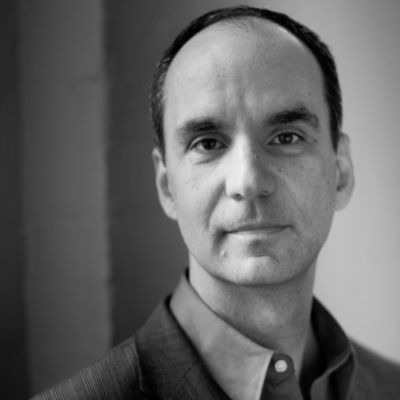Any opportunity to see La Gioconda, Ponchielli’s weird, dark amalgam of Italian verismo and French grand opera, should be an event. Stagings are a rarity, even on its native Italian soil. So, this re-envisioned revival of Hungarian State Opera’s 2019 production is all the more disappointing. Despite some gorgeous visuals and a majority of principals who possess the vocal goods, this Gioconda didn’t leave much to smile about.
Images from director András Almási-Tóth’s original 2019 vision indicate something less conventional than what is being presented in 2025. Then, the side-room that descends from the flies oh-so-many times was a stark white, modernist cubicle that stood in sharp contrast to the colourful period costumes. This time round, that space is more aesthetically in tune with the grisaille-patterned backdrops that hang in strict one-point perspective. As the company notes, these richly Baroque sets by Krisztina Lisztopád “harmonise well with the historically accurate costumes designed by Bori Tóth for the 2019 production.”
Nothing wrong with that, but either there wasn’t enough rehearsal time or no one told the principals and chorus that the rigid, rectilinear aesthetic did not also apply to them. La Gioconda is relentless in its exploration of betrayal, murder and infidelity. Hardly any of that transferred to the human beings on stage who too-often stood motionless. Perhaps this was a late-season blip for a company that punches above its weight in terms of numbers of performances and variety of repertoire?
Despite these problems, there were some outstanding performances that deserve praise. Two of the company's best lower-voiced females shone, despite the overall tepidness. As Laura, who loves Enzo despite being married to the head of the Inquisition, mezzo-soprano Andrea Szántó was the evening’s outstanding singer. She understands that excellent vocalism is just the start, giving a generous, fully physically-engaged performance. As Gioconda’s blind mother La Cieca, contralto Atala Schöck offered rich tone and impressive chest notes in one of the opera’s most memorable melodies, “Voce di donna.” Despite the stillness demanded by her affliction, Schöck conveyed the character’s essential goodness through solid vocalism and careful delivery of text.
As the feckless Enzo, Italian tenor Stefano La Colla’s pingy tone certainly carried in the house, but there was no attempt at poetry, nor to go beyond stock gestures. Likewise, as the evil spy Barnaba, a role that must have been a model for Verdi’s Iago in Otello, baritone Csaba Szegedi possesses the right sound and technique, but failed to inhabit his character to the full extent. Bass Krisztián Cser was more convincing as Laura’s husband, Alvise, using his lyric basso cantante to good effect.
Which brings us to Francesca Tiburzi in the title role. Any soprano taking on Gioconda has to contend with iconic portrayals by past greats like Maria Callas, Renata Tebaldi and indeed, Hungary’s legendary Éva Marton who is listed as an artistic consultant for this revival. Unfortunately, despite possessing a generally-agreeable sound, Tiburzi lacked the means to convey Gioconda’s complexity. The role is a gift to any singer who can abandon herself to its vocal and emotional extremes, but in that regard, Tiburzi was simply not up to that task. She consistently sang under pitch in her ascents to her upper range. There were occasional glints of what could have been in phrases that soared, but the role demands a lot of lower, parlando singing that was consistently under-projected. For a native Italian, her diction was strangely muffled.

The production contained many oddities that did not help the performers. Huge chunks of the score were cut which obfuscated, rather than improved, the drama. For example, the Dance of the Hours ballet, the opera’s most famous music, is meant as an entertainment for the nobles who attend a party at Laura and Alvise’s Venetian villa. Here, the introduction of the guests is completely excised, so that the scene opens on the dancers, offering no context as to why they are there and for whom they are performing. Wearing sleek unitards patterned with grisaille imagery to match the sets and dancing contemporary choreography, their contribution completely mismatched the period setting. A pool of water through which the singers repeatedly sloshed added nothing dramatically, nor did the intrusive sound of falling rain (why?) during an otherwise well-sung Laura–Enzo duet in Act 2.
János Kovács led the always excellent Hungarian State Opera Orchestra and Chorus. His vast experience as an opera conductor put him in good stead when his lead soprano took some especially indulgent tempi. With a musical foundation such as this, it’s a shame the dramatic spark was largely missing.


